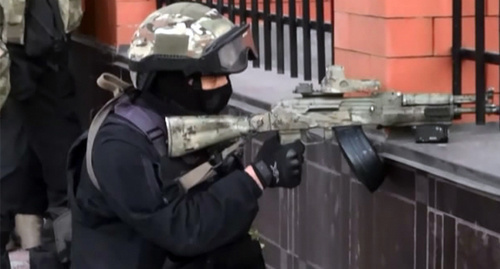
27 March 2017, 03:31
On March 20-26, 2017, 15 persons fell victim to armed conflict in Northern Caucasus
During the week of March 20-26, 2017, 15 persons fell victim to the armed conflict in Northern Caucasus. Of them, 12 were killed, and three others were wounded. These are the results of the calculations run by the "Caucasian Knot" based on its own materials and information from other open sources.
The death toll includes six law enforcers and six suspected members of the armed underground, all of them in Chechnya.
Attacks on law enforcers
On March 24, between 2:00 and 3:00 a.m. Moscow time in the Naur District of Chechnya, in the district centre of the Cossack village of Naurskaya, a group of eight militants attacked the checkpoint of the 140th artillery regiment of the 46th brigade of the operational assignment troops of the National Guard of Russia. Taking advantage of strong fog, the attackers attempted to enter the territory of the military camp of the National Guard, but were discovered by a military squad, which entered into battle with them. The armed clash lasted about an hour. As a result of the attack, six fighters of the 140th artillery regiment of the National Guard troops were killed and three others got injuries of varying severity. The condition of one of the wounded fighters is estimated as severe, while the two other wounded fighters stay in medium severity. Six of the attackers were also killed, while two others managed to flee. Near the killed fighters, firearms and ammunition were discovered, while two killed suspects had fake shahid belts on their bodies. The number of the killed fighters of the National Guard includes Senior Sergeants Anatoly Ermolaev and Amin Aliev, Junior Sergeants Dmitri Gurat and Ildus Kuchukbaev, Corporal Zaurbek Akbiev, and private soldier Arsen Ramazanov. All six killed militants resided in the Cossack village of Naurskaya and were relatives and friends. Three of them were identified as Muridov brothers, natives of the Naurskaya, and three others as Zakaraev, Akbulatov and Musaliev, who came from the Rostov and Volgograd Regions. The organization "Islamic State" (IS), banned by Russia, claimed responsibility for the attack on the military camp of the National Guard. On the same day, the father of the Muridov brothers was detained together with other close relatives of the militants. Mass detentions of young people with beards were carried out not only in the Naur District, but also in Grozny.
Disappearance
On March 14, Apti Kharaev, a resident of the Urus-Martan District of Chechnya, disappeared under unclear circumstances. Since then, nothing is known about his whereabouts. Apti Kharaev was involved in the armed confrontation with federal agencies during the first Chechen war. In 2001, Apti Kharaev was detained and sentenced by the Krasnodar Regional Court for 15.5 years of imprisonment for involvement in combat actions on the side of the self-proclaimed Chechen Republic of Ichkeria. On March 2, he was released after he had served his sentence and returned home. On March 15, Apti Kharaev's relatives appealed to the Urus-Martan Department of the regional Federal Migration Service (FMS). There, officials confirmed that on the day before, Apti Kharaev visited their office. Meanwhile, the officials from the FMS also reported that Apti Kharaev was recommended to visit the local ROVD (District Interior Division) after the FMS Department. According to his relatives, Apti Kharaev never reached the local ROVD. Meanwhile, the policeman, who denied the Apti Kharaev's visit to the local ROVD, had a photo of Apti in the mobile phone and showed it to his mother. The policeman also informed the woman that before the visit of his relatives, "several people had already been interested in the whereabouts" of Apti Kharaev. According to a source acquainted with Apti Kharaev the man could be killed by order of a top-ranking official from the district administration.
Kidnappings
On March 21, the police got the information stating that Idris Kostoev, a 27-year-old resident of the village of Yandare of the Nazran District of Ingushetia, left home and never returned. The information about the circumstances of his unclear disappearance was controversial. On March 23, Idris Kostoev was brought to the IngushRepublicanClinicalHospital in Nazran with bodily injuries. According to the victim, he got his injuries inflicted by unidentified persons, who on March 22 forcibly took him away to some unidentified place, where they kept him during two days. Officials from the Ministry of Internal Affairs (MIA) have noted that they do not exclude the involvement of the law enforcement bodies in the kidnapping of Idris Kostoev; however, the criminals have not been yet identified and their occupation have not yet been revealed.




